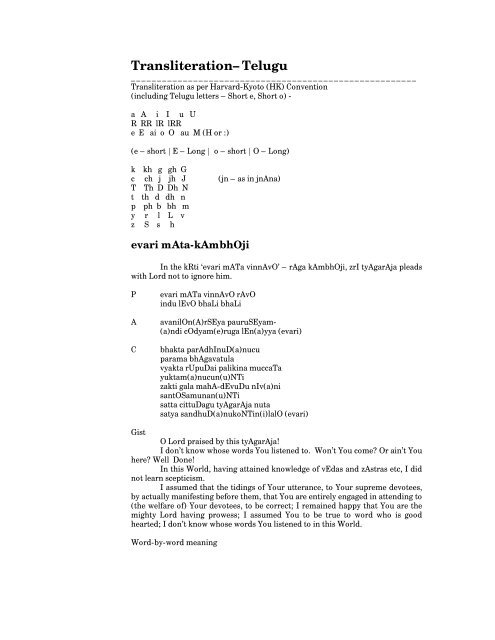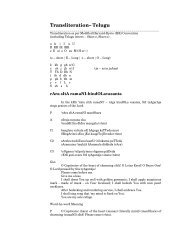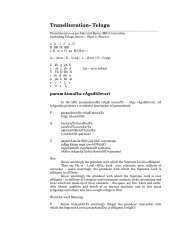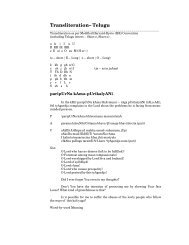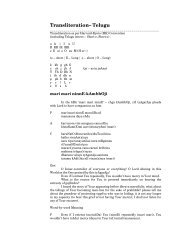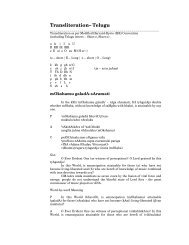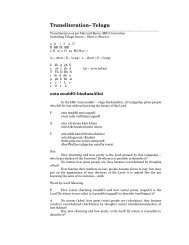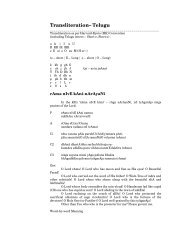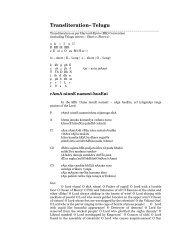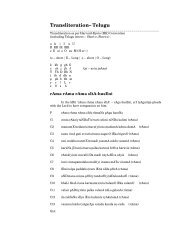You also want an ePaper? Increase the reach of your titles
YUMPU automatically turns print PDFs into web optimized ePapers that Google loves.
Transliteration–Telugu<br />
_______________________________________________________<br />
Transliteration as per Harvard-Kyoto (HK) Convention<br />
(including Telugu letters – Short e, Short o) -<br />
a A i I u U<br />
R RR lR lRR<br />
e E ai o O au M (H or :)<br />
(e – short | E – Long | o – short | O – Long)<br />
k kh g gh G<br />
c ch j jh J (jn – as in jnAna)<br />
T Th D Dh N<br />
t th d dh n<br />
p ph b bh m<br />
y r l L v<br />
z S s h<br />
<strong>evari</strong> <strong>mAta</strong>-<strong>kAmbhOji</strong><br />
In the kRti ‘<strong>evari</strong> mATa vinnAvO’ – rAga <strong>kAmbhOji</strong>, zrI tyAgarAja pleads<br />
with Lord not to ignore him.<br />
P<br />
A<br />
C<br />
<strong>evari</strong> mATa vinnAvO rAvO<br />
indu lEvO bhaLi bhaLi<br />
avanilOn(A)rSEya pauruSEyam-<br />
(a)ndi cOdyam(e)ruga lEn(a)yya (<strong>evari</strong>)<br />
bhakta parAdhInuD(a)nucu<br />
parama bhAgavatula<br />
vyakta rUpuDai palikina muccaTa<br />
yuktam(a)nucun(u)NTi<br />
zakti gala mahA-dEvuDu nIv(a)ni<br />
santOSamunan(u)NTi<br />
satta cittuDagu tyAgarAja nuta<br />
satya sandhuD(a)nukoNTin(i)lalO (<strong>evari</strong>)<br />
Gist<br />
O Lord praised by this tyAgarAja!<br />
I don’t know whose words You listened to. Won’t You come Or ain’t You<br />
here Well Done!<br />
In this World, having attained knowledge of vEdas and zAstras etc, I did<br />
not learn scepticism.<br />
I assumed that the tidings of Your utterance, to Your supreme devotees,<br />
by actually manifesting before them, that You are entirely engaged in attending to<br />
(the welfare of) Your devotees, to be correct; I remained happy that You are the<br />
mighty Lord having prowess; I assumed You to be true to word who is good<br />
hearted; I don’t know whose words You listened to in this World.<br />
Word-by-word meaning
P O Lord! I don’t know whose (<strong>evari</strong>) words (mATa) You listened to<br />
(vinnAvO). Won’t You come (rAvO) Or ain’t You (lEvO) here (indu) Well Done<br />
(bhaLi bhaLi)!<br />
A O Lord (ayya)! In this World (avanilO), having attained (andi) knowledge<br />
of vEdas (ArSEya) (literally derived from RSis) (avanilOnArSEya) and zAstras etc<br />
(pauruSEyamu) (pauruSEyamandi),<br />
I did not (lEnu) (lEnayya) learn (eruga) scepticism (cOdyamu) (literally<br />
questioning) (cOdyameruga);<br />
I don’t know whose words You listened to. Won’t You come Or ain’t You<br />
here Well Done!<br />
C I assumed (uNTi) that (anucunu) the tidings (muccaTa) of Your<br />
utterance (palikina),<br />
to Your supreme (parama) devotees (bhAgavatula), by actually<br />
manifesting before them (vyakta rUpuDai) that (anucu),<br />
You are entirely engaged in attending (parAdhInuDu)<br />
(parAdhiNuDanucu) to (the welfare of) Your devotees (bhakta),<br />
to be correct (yuktamu) (yuktamanucunuNTi);<br />
I remained (uNTi) happy (santOSamunanu) (santOSamunanuNTi) that<br />
(ani) You (nIvu) (nIvani) are the mighty Lord (mahA-dEvuDu) having (gala)<br />
prowess (zakti);<br />
I assumed (anukoNTini) You to be true to word (satya sandhuDu) who is<br />
good (satta) hearted (cittuDagu);<br />
O Lord praised (nuta) by this tyAgarAja! I don’t know whose words You<br />
listened to in this World (ilalO) (sandhuDanukoNTinilalO). Won’t You come Or<br />
ain’t You here Well Done!<br />
Notes –<br />
P – bhaLi bhaLi – Well Done – This is a sarcastic usage.<br />
A – pauruSEya – The following explanation given by kAJci mahAsvAmi<br />
candrazEkharEndra sarasvati in the following website, clarifies the term –<br />
“...revealed texts - we call the same ‘apauruseya’ (not the work of a<br />
human author). What men do of their own accord is ‘pauruseya’ and what the<br />
paramatman reveals, using man as a mere instrument, is ‘apauruseya’.<br />
Source – ‘Hindu Dharma’ - English translation of certain invaluable and<br />
engrossing speeches of Sri Sri Sri Chandrasekharendra Saraswathi MahaSwamiji<br />
at various times during the years 1884 to 1994. website -<br />
http://www.kamakoti.org/hindudharma/part5/chap1.htm<br />
A – ArSEya – derived from RSis – With reference to the meaning<br />
‘pauruSEya’ (as given above), ArSEya, in my humble opinion, would mean the<br />
same as ‘apauruSEya’ – vEdas – revealed texts – derived from RSis – the mantra<br />
draSTA – ‘seer’ of mantras.<br />
A – cOdya – The term also means ‘wonderment’, ‘raising questions’ etc.<br />
Keeping in view the statements made by zrI tyAgarAja in the caraNa, I feel that<br />
what zrI tyAgarAja wants to convey is that he had glibly accepted Lord’s words<br />
unhesitatingly as true; but he now finds them to be not so. He wonders whether<br />
that is because of somebody’s instigation (<strong>evari</strong> <strong>mAta</strong> vinnAvO). The same kind of<br />
doubt is voiced by the zrI tyAgarAja in the kRti ‘nagu mOmu gana lEni’ – rAga<br />
AbhEri also – whether the people surrounding Him are instigating Him not to<br />
have compassion on the him.<br />
General – Please visit the site for a discussion on the kRti –<br />
http://www.ibiblio.org/sripedia/oppiliappan/archives/jun03/msg00011.html
Devanagari<br />
{É. B´ÉÊ®ú ¨ÉÉ]õ Ê´ÉzÉÉ´ÉÉä ®úÉ´ÉÉä<br />
@. @ª«s¬sÍÜ[(©y)lL
×®«p GYo ùNôpûXd úLhPôúVô YôWôúVô<br />
Ce¡pûXúVô TúX TúX!!<br />
Kannada<br />
®Ú. GÈÚÂ ÈÚáÛl É«Û−ÈæãÞ ÁÛÈæãÞ<br />
B«Úߧ ÅæÞÈæãÞ ºÚØ ºÚØ<br />
@. @ÈÚ¬ÅæàÞ(«Û)ÁæÐÞ¾Úß ®èÁÚßÎæÞ¾Úß(ÈÚß)¬§<br />
^æàÞ¥ÚÀ(Èæß)ÁÚßVÚ ÅæÞ(«Ú)¾ÚßÀ (GÈÚÂ)<br />
^Ú. ºÚOÚ¡ ®ÚÁÛ©Þ«Úß(sÚ)«Úß^Úß<br />
®ÚÁÚÈÚß ºÛVÚÈÚ}ÚßÄ<br />
ÈÚÀOÚ¡ ÁÚà®Úâ´sæç ®ÚÆP«Ú ÈÚßß^Ú`l<br />
¾ÚßßOÚ¡(ÈÚß)«Úß^Úß(«Úß){o<br />
ËÚP¡ VÚÄ ÈÚßÔÛ-¥æÞÈÚâ´sÚß ¬Þ(ÈÚ)¬<br />
ÑÚ«æà¡ÞÎÚÈÚßß«Ú(«Úß){o<br />
ÑÚ}Ú¡ _}Úß¡sÚVÚß }ÛÀVÚÁÛd «Úß}Ú<br />
ÑÚ}ÚÀ ÑÚ«Úߪ(sÚ)«ÚßOæà{o(¬)ÄÅæàÞ (GÈÚÂ)<br />
Malayalam<br />
]. Fhcn amS hnmthm cmthm<br />
Cμp tethm `fn `fn<br />
A. Ah\ntem(\m)cvtjb ]ucptjb(a)μn<br />
tNmZy(sa)cpK te(\)¿ (Fhcn)<br />
N. `à ]cm[o\p(U)\pNp<br />
]ca `mKhXpe<br />
hyà cq]pssU ]enIn\ ap¨S<br />
bpà(a)\pNp(\p)−n<br />
iàn Ke almþtZhpUp \o(h)\n<br />
kt´mjap\(\p)−n<br />
k¯ Nn¯pUKp XymKcmP \pX<br />
kXy kÔp(U)\psIm−n(\n)etem (Fhcn)<br />
Assamese<br />
Y. A¾×» ]çOô ×¾~çã¾ç »çã¾ç<br />
+³VÇ å_ã¾ç \ö×_ \ö×_
%. %¾×Xã_ç(Xç)åbïÌ^ åYì»ÓãbÌ^(])׳V<br />
æ$Jôç²Ì^(å])»ÓG å_(X)Ì^ËÌ^ (A¾×»)<br />
$Jô. \öNþ Y»çWýÝXÇ(Qö)XÇÅ$JÇô<br />
Y»] \öçG¾TÇö_<br />
¾ËÌ^Nþ »ÖYÇêQö Y×_×EõX ]ǬJôOô<br />
Ì^ÇNþ(])XÇÅ$JÇô(XÇ)×°Oô<br />
`×Nþ G_ ]c÷ç-åV¾ÇQÇö XÝ(¾)×X<br />
aãÜöçb]ÇX(XÇ)×°Oô<br />
awø ×$JôwÇøQöm ±Ì^çG»çL XÇTö<br />
a±Ì^ aμÇù(Qö)XÇãEõç×°Oô(×X)_ã_ç (A¾×»)<br />
Bengali<br />
Y. A[ý×Ì[ý ]çOô ×[ý~çã[ýç Ì[ýçã[ýç<br />
+³VÇ å_ã[ýç \ö×_ \ö×_<br />
%. %[ý×Xã_ç(Xç)åbïÌ^ åYìÌ[ýÓãbÌ^(])׳V<br />
æ»Jôç²Ì^(å])Ì[ýÓG å_(X)Ì^ËÌ^ (A[ý×Ì[ý)<br />
»Jô. \öNþ YÌ[ýçWýÝXÇ(Qö)XÇÅ»JÇô<br />
YÌ[ý] \öçG[ýTÇö_<br />
[ýËÌ^Nþ Ì[ýÖYÇêQö Y×_×EõX ]ǬJôOô<br />
Ì^ÇNþ(])XÇÅ»JÇô(XÇ)×°Oô<br />
`×Nþ G_ ]c÷ç-åV[ýÇQÇö XÝ([ý)×X<br />
aãÜöçb]ÇX(XÇ)×°Oô<br />
awø ×»JôwÇøQöm ±Ì^çGÌ[ýçL XÇTö<br />
a±Ì^ aμÇù(Qö)XÇãEõç×°Oô(×X)_ã_ç (A[ý×Ì[ý)<br />
Gujarati<br />
~É. +è´ÉÊ−÷ ©ÉÉ`ò Ê´É}ÉÉ´ÉÉà −÷É´ÉÉà
A. Amu`k¨(`s)jo~h a¬jxo~h(g)u`]<br />
M¨]i(g~)jxI k~(`)hi (B~muj)<br />
M. eEY ajs_v`x(U)`xMx<br />
ajg esImYxk<br />
miEY jyaxU¤ aukuE` gx°MS<br />
hxEY(g)`xMx(`x)uXS<br />
ouEY Ik gps-]~mxUx `v(m)u`<br />
n`Y©ogx`(`x)uXS<br />
n°Y uM°YxUIx YisIjsO `xY<br />
nYi n`_x(U)`xE¨uXS(u`)kk¨ (B~muj)


